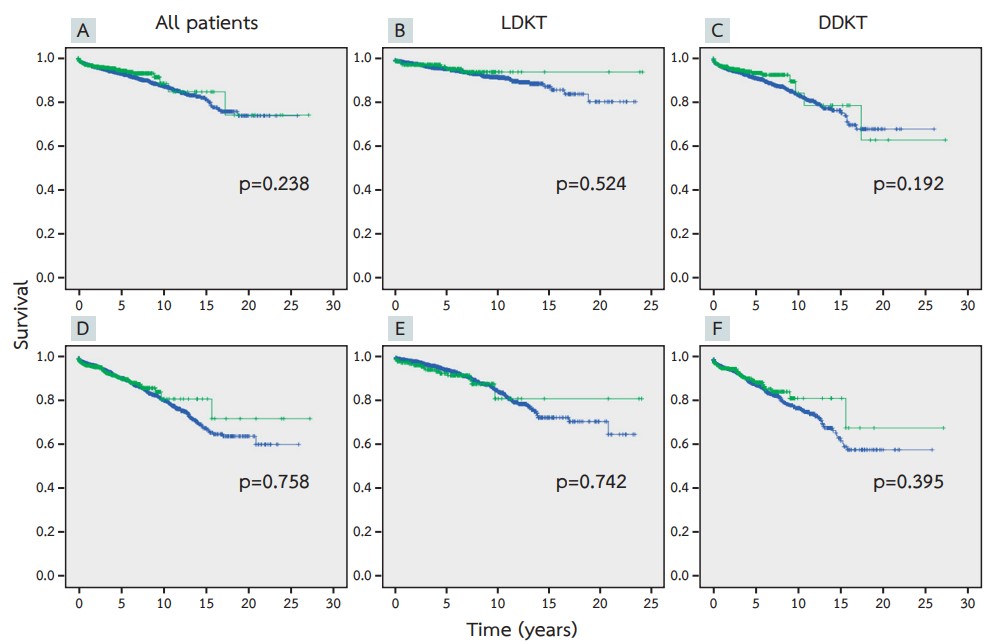Pretransplant Dialytic Modality and Outcomes of Kidney Transplantation: Analysis of the Nationwide Data from Thailand Transplant Registry
Main Article Content
Abstract
Background: Kidney transplantation (KT) is the best option for kidney replacement therapy. The data on the impact of pretransplant dialytic modality on outcomes of KT remain conflicting. The aim of the present study was to evaluate the association between pretransplant dialytic modality and outcomes of KT.
Methods: This is a retrospective cohort study of 8,097 patients that received KT between 1987 to 2020 from Thailand transplant registry database. There were 5,038 patients that met the inclusion criteria, 634 received peritoneal dialysis (PD) and 4,404 received hemodialysis (HD). The primary outcomes were 1-year, 5-year and 10-year patient and death-censored graft survival (DCGS). The secondary outcomes were delayed graft function (DGF) and acute rejection.
Results: There were no differences in patient survival (PD vs. HD, adjusted hazard ratio 1.23 (0.77-1.96), p=0.391) and DCGS (1.50 (0.95-2.39), p=0.083). Overall, the PD group experienced lower incidence of DGF (adjusted odds ratio 0.71 (0.56-0.91), p=0.006) which was more pronounced in the subgroup of decreased donor KT (0.69 (0.53-0.89), p=0.004). Lower incidence of DGF was also observed among deceased donor KT recipients that received maintenance HD for <12 months. The incidence of acute rejection was comparable between the two groups (adjusted odds ratio 0.47 (0.17-1.32), p=0.149).
Conclusion: There were no associations between pretransplant dialytic modality with patient and graft survival and the incidence of acute rejection. The incidence of DGF was significantly lower in the recipients that received PD especially in the subgroup that underwent deceased donor KT.
Article Details

This work is licensed under a Creative Commons Attribution-NonCommercial-NoDerivatives 4.0 International License.
This article is published under CC BY-NC-ND 4.0 license, which allows for non-commercial reuse of the published paper as long as the published paper is fully attributed. Anyone can share (copy and redistribute) the material in any medium or format without having to ask permission from the author or the Nephrology Society of Thailand.
References
Oliva MOL, Rivas B, Fernadez EP, Ossorio M, Ros S, Chica C, et al. Pretransplant peritoneal dialysis relative to hemodialysis improves long-term survival of kidney transplant patients: a single center observational study. Int Urol Nephrol. 2014;46(4):825–32.
Freitas C, Fructuoso M, Martins LS, Almeida M, Pedroso S, Dias L, et al. Posttransplant outcomes of peritoneal dialysis versus hemodialysis patients. Transplant Proc. 2011;43(1):113–6.
Tang M, Li T, Liu H. A Comparison of Transplant Outcomes in Peritoneal and Hemodialysis Patients: A Meta-Analysis. Blood Purif. 2016;42(2):170-6.
Rumyantzev GAS, Hurdle JF, Scandling JD, Baird BC, Cheung AK. The role of pretransplantation renal replacement therapy modality in kidney allograft and recipient survival. Am J Kidney Dis. 2005;46(3):537–49.
Resende L, Guerra J, Santana A, Homens CM, Abreu F, Costa AGD. Influence of dialysis duration and modality on kidney transplant outcomes. Transplant Proc. 2009;41(3):837-9.
Dipalma T, Ruiz MF, Praga M, Polanco N, Gonzalez E, Solis EG, et al. Pre-transplant dialysis modality does not influence short- or long-term outcome in kidney transplant recipients: analysis of paired kidneys from the same deceased donor. Clin Transplant. 2016;30(9):1097-107.
Lin HT, Liu FC, Lin JR, Pang ST, Yu HP. Impact of the pretransplant dialysis modality on kidney transplantation outcomes: a nationwide cohort study. BMJ Open. 2018;8(6):e020558.
Ardalan M, Etemadi J, Ghabili K, Ghojazadeh M, Ghafari A, Khosroshahi HT. Effect of dialysis modality on transplantation outcome in living-donor renal transplantation. Nephrourol Mon. 2011;3:202–7.
Snyder JJ, Kasiske BL, Gilbertson DT, Collins AJ. A comparison of transplant outcomes in peritoneal and hemodialysis patients. Kidney Int. 2002;62(4):1423–30.
Molnar MZ, Mehrotra R, Duong U, Bunnapradist S, Lukowsky LR, Krishnan M, et al. Dialysis modality and outcomes in kidney transplant recipients. Clin J Am Soc Nephrol. 2012;7(2):332–41.
Schwenger V, Dohler B, Morath C, Zeier M, Opelz G. The role of pretransplant dialysis modality on renal allograft outcome. Nephrol Dial Transplant. 2011;26(11):3761–6.
Sezer S, Karakan S, Acar O, Haberal M. Dialysis as a bridge therapy to renal transplantation: comparison of graft outcomes according to mode of dialysis treatment. Transplant Proc. 2011;43(2):485–7.
Barany P, Divino FJC, Bergstrom J. High C-reactive protein is a strong predictor of resistance to erythropoietin in hemodialysis patients. Am J Kidney Dis. 1997;29(4):565–8.
Conti G, Amore A, Chiesa M, Mancuso D, Cirina P, Mengozzi G, et al. Procalcitonin as a marker of micro-inflammation in hemodialysis. J Nephrol. 2005;18(3):282–8.
Schwabe RF, Engelmann H, Hess S, Fricke H. Soluble CD40 in the serum of healthy donors, patients with chronic renal failure, haemodialysis and chronic ambulatory peritoneal dialysis (CAPD) patients. Clin Exp Immunol. 1999;117(1):153–8.
Vats AN, Donaldson L, Fine RN, Chavers BM. Pretransplant dialysis status and outcome of renal transplantation in North American children: a NAPRTCS study. Transplantation. 2000;69(7):1414-9.
Sanfilippo F, Vaughn WK, Spees EK, Lucas BA. The detrimental effects of delayed graft function in cadaver donor renal transplantation. Transplantation. 1984;38(6):643–8.
Joseph JT, Jindal RM. Influence of dialysis on post-transplant events. Clin Transplant. 2002;16(1):18–23.


